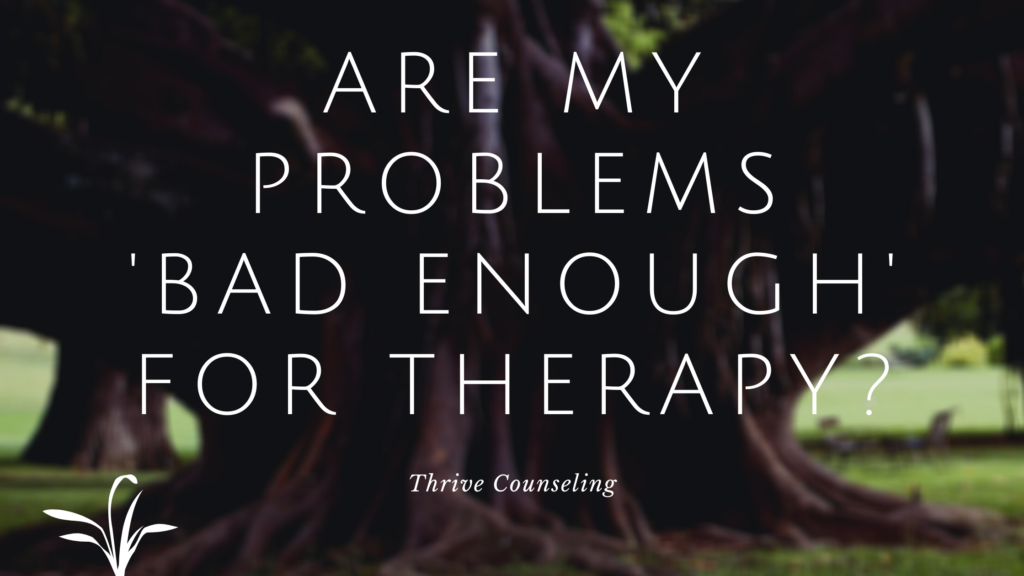By Jessica Taylor, LPC
Are my problems serious enough for therapy?
Do I really need therapy for this? Isn’t that for really crazy people?
I’m just sad, but am I really depressed? Is this something people go to therapy for?
My mental health cycles; sometimes I can be fine for a while, but other times I’ll have periodic breakdowns or times where I’m extremely anxious or upset, but then I cycle right back into being fine for a while again.
One concern that we often hear from clients, usually during our first session together, is “Are my problems bad enough for therapy?” This is sometimes even followed up with something like “I feel bad complaining about this when so many people have it worse than me…”
Is This Serious Enough for Therapy?
Yes, therapists are trained to work with individuals that are experiencing symptoms of mental illness. But we are also well-versed in providing a space for you to navigate non-clinical issues such as relationship and transitional life concerns (such as a new job or recent move). A lot of our clients are functioning pretty well day-to-day but are struggling to determine whether or not their current love relationship is right for them. Or are feeling insecure about not yet making friends in a new city.
Many people see therapists for issues big and small. a recent survey found almost half of people either saw a therapist themselves or had something in their household who saw one.
Can My Friends and Family Just Give Me Advice?
You may have friends and family members that are willing to listen to you vent, and even give some good advice. But this is a completely different process then seeing a therapist. Your therapist will come to the relationship with their only job being that they hear you and try to understand why you feel a certain way, so that they can give you unbiased and nonjudgmental feedback. In addition, you don’t need to feel concerned that you might be burdening your therapist (as we often worry when are opening up to friends and family), because the sole purpose of your session together is to use the time in a way that is beneficial for you. In other words, therapy allows us to be a bit selfish!
You have probably heard at least one person say, “I think everyone should go to therapy!” This is because they have recognized that therapy is a tool that is useful for a wide range of issues, from symptoms of mental illness, to the desire to make improvements in specific areas of life.
If You Have To Ask, Go Find A Therapist
If you’re asking yourself the question, then that means something. If you are thinking that therapy might be helpful, it’s probably time to find a counselor you ‘click’ with (sometimes this can take a few tries). Waiting until it impacts your daily functioning makes the process of finding a therapist even more difficult.
Don’t Wait Until It Gets Bad
Mental health issues are often cyclical. Everyone has good days and bad days relative to their baseline functioning. (eg – a good day for someone with major depression might be just that they were able to get out of bed in the morning). Don’t wait until it gets very bad. When our mental health takes a dive it’s hard enough to get up and go to work, let alone find a therapist and go see that person. If you get set up with regular visits now, you’ll have that person there for support when you need it most. Also, as a side note, Some of the most helpful sessions for clients often happen on weeks when they didn’t feel like they needed to go.
You Don’t Need to Make a Weekly Commitment
Most therapists won’t hold you to a weekly requirement. We have clients that we see once a month or every other week. These clients will call and come in more frequently when they feel like they need the support, but stick to the less frequent sessions when they feel like they are doing okay.
Therapy is Not a Dramatic Step
As one commenter online puts it:
Therapy is not a dramatic step. It really isn’t. Tons of people go to therapy. Lots of “normal” people go. Find one and go. Sometimes you have to see a couple before you find one you are comfortable with. It’s not a big deal to go see one though and it doesn’t “mean” anything that you are in therapy. It doesn’t change anything about who you are as a person. It just means you are being responsible about another aspect of your health. Period. That’s it. Go. You don’t have to be at you’re worst to see a therapist. Anyone can benefit from therapy even if their life isn’t spiraling out of control.
If you are wondering whether or not therapy could become a useful tool in your life, give us a call and we will happily answer any questions you have about the process.

